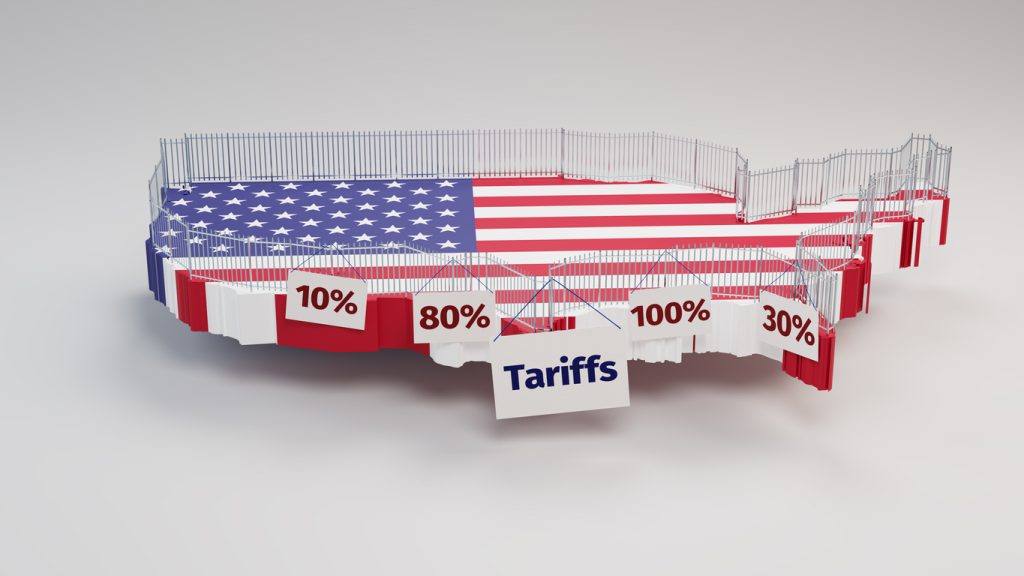The disruption, the tension and the balancing act: Suspense on Wall Street

The past week seemed to mimic the twists and turns of a suspense thriller. It began with AI disruption sparking market anxiety after news broke about DeepSeek, a relatively unknown Chinese artificial intelligence startup. The company unveiled its open-source AI model, R1, claiming it could outperform industry-leading models from U.S. tech giants like OpenAI, Google and Meta. Developed at a fraction of the cost and with significantly lower energy consumption, R1’s emergence raised fears of increased competition in the AI sector. Investors reacted swiftly, sending the Nasdaq tumbling and erasing nearly $1 trillion in market value on Monday alone. The sudden emergence of DeepSeek underscored the competitive pressures facing American AI firms. (Source: Bloomberg News)

Chief Investment Officer Thierry Hasse
New Tariffs Spook Markets
As markets attempted to recover midweek, investor sentiment took another hit late Friday when the White House announced aggressive new tariffs – 25% on imports from Mexico and Canada and 10% on Chinese imports – would be included in weekend executive orders covering the three biggest trading partners of the U.S. The news sent shockwaves and exacerbated concerns about supply chain disruptions and inflation. Consequently:
- The Nasdaq ended the week down 1.6%, led by a 16% drop in Nvidia (NVDA).
- The S&P 500 also declined by 1%, as investors reassessed economic growth prospects.
- Investors closed the week bracing for potential retaliatory measures from affected trading partners. (Source: CNBC)
The Fed Balancing Act
Amid the whirlwind of dramatic market fluctuations, the Federal Reserve convened for its scheduled Federal Open Markets Committee meeting on Wednesday. Unlike the high-stakes headlines dominating equity markets, this event unfolded as anticipated—quietly and without much fanfare. One might even say it was somewhat dull. Policymakers chose to keep interest rates unchanged, reaffirming that the U.S. economy remains on solid ground while signaling patience in adjusting monetary policy.
On Friday, the Bureau of Economic Analysis confirmed that the Fed’s preferred inflation measure, the Personal Consumption Expenditures (PCE) Index, remained at 2.8% year-over-year—still above the 2% target, but showing no signs of re-acceleration. With inflation stabilizing and the labor market holding firm, the Fed finds itself in a precarious position—balancing the need to avoid reigniting inflation while also maintaining economic stability. While rate hikes appear to be off the table, rate cuts remain a distant possibility, keeping investors on edge about the Fed’s next move. The central bank’s cautious approach suggests that 2025 may bring more of the same: steady rates, measured rhetoric and heightened scrutiny of economic data.
Looking Ahead: Trade Retaliation and Economic Fallout
As the new tariffs loom, global leaders have responded swiftly. Over the weekend, officials from Canada, Mexico and China announced retaliatory measures, escalating fears of a full-scale trade war.
- Canada and Mexico: Leaders from both countries condemned the tariffs, warning of countermeasures that could include new levies on U.S. agricultural goods and key industrial exports. Canada has already signaled plans to impose tariffs on U.S. steel and aluminum, while Mexico is reportedly considering similar actions on auto parts and food products.
- China: Beijing has promised a swift response, and speculation is growing over increased restrictions on American technology firms and agricultural exports. Sources indicate China is considering new limits on rare earth mineral exports, which are critical for the production of semiconductors and batteries for electric vehicles.
- Market Impact: With tariffs now set to go into effect on Tuesday, rather than March, investors are bracing for heightened volatility. Today the S&P 500, Dow Jones Industrial Average, and the Nasdaq all opened down more than 1% amid the opening salvos of the trade war. Analysts anticipate that any further retaliatory steps from trading partners could impact corporate earnings, supply chains and consumer prices.
Meanwhile, the coming week will also bring major earnings reports from Google on Tuesday and Amazon and Eli Lilly on Thursday. The January employment report on Friday will be closely watched as an indicator of labor market resilience in the face of growing economic uncertainty.
The Story Continues
Like any gripping financial drama, the tension is building and the stakes are rising. AI breakthroughs, trade battles and economic policy shifts are reshaping the investment landscape, demanding vigilance and adaptability. Will global markets absorb these shocks and press forward, or will escalating conflicts trigger a deeper reckoning?
We believe that the days and weeks ahead promise more volatility, more headlines and more opportunities. At Elevage Partners, we remain focused on filtering the noise and deciphering the signals. Stay with us as we track the turns in this unfolding story.
The information contained herein represents the views of Elevage Partners at a specific point in time and is based on information believed to be reliable. No representation or warranty is made concerning the accuracy of any data compiled herein In addition, there can be no guarantee that any projection, forecast, or opinion in these materials will be realized. Any statement non-factual in nature constitutes only current opinion which is subject to change. These materials are provided for informational purposes only and do not constitute investment advice. Any reference to a security listed herein does not constitute a recommendation to buy, sell, or hold such security. Past performance is no guarantee of future results. The historical returns of any securities and/or sectors mentioned in this commentary are not necessarily indicative of their future performance.
